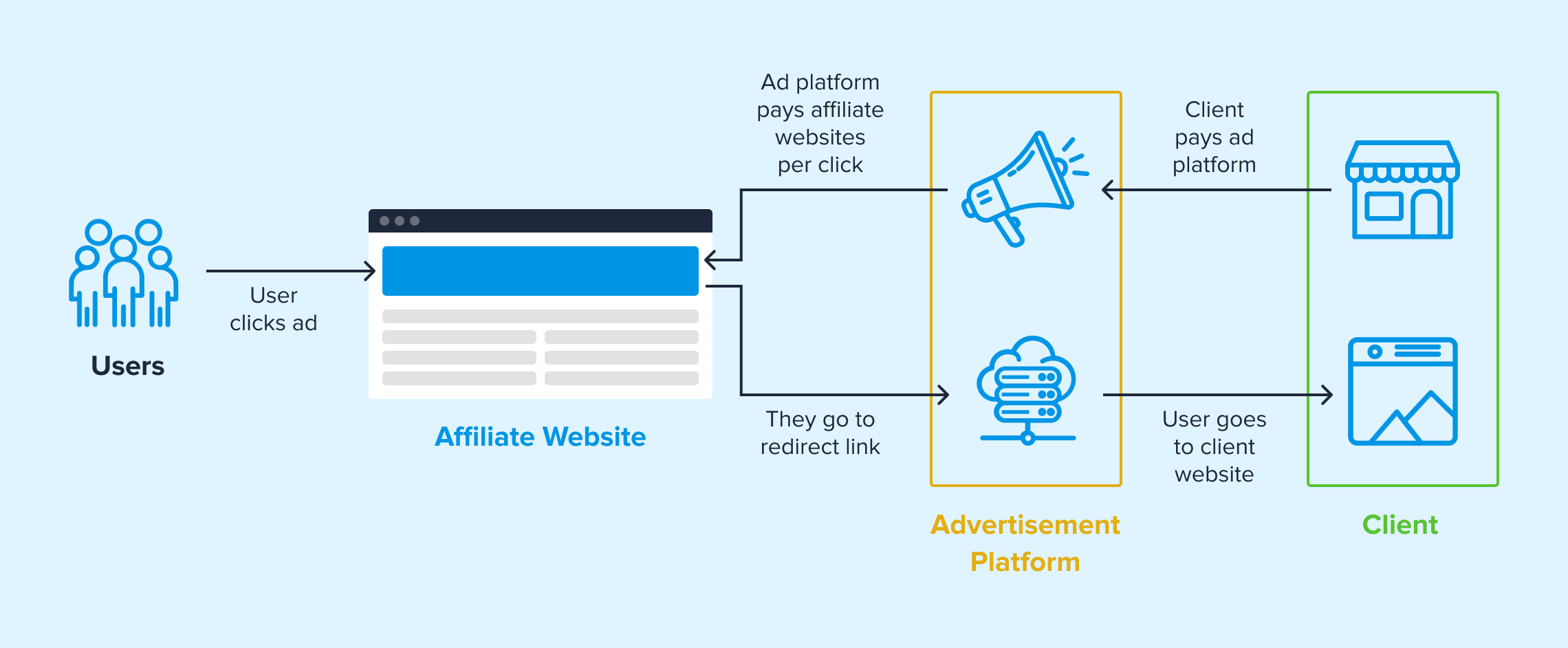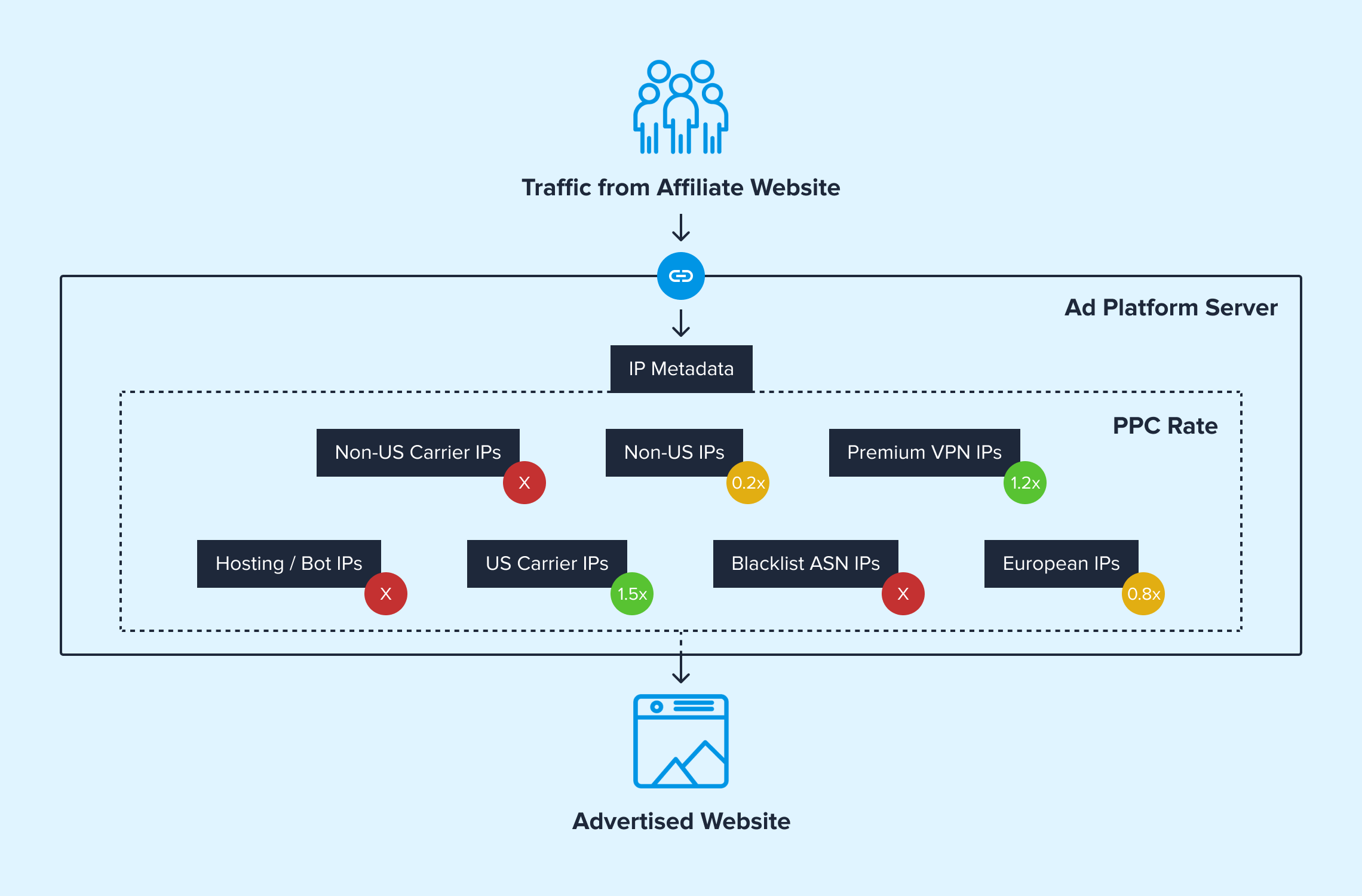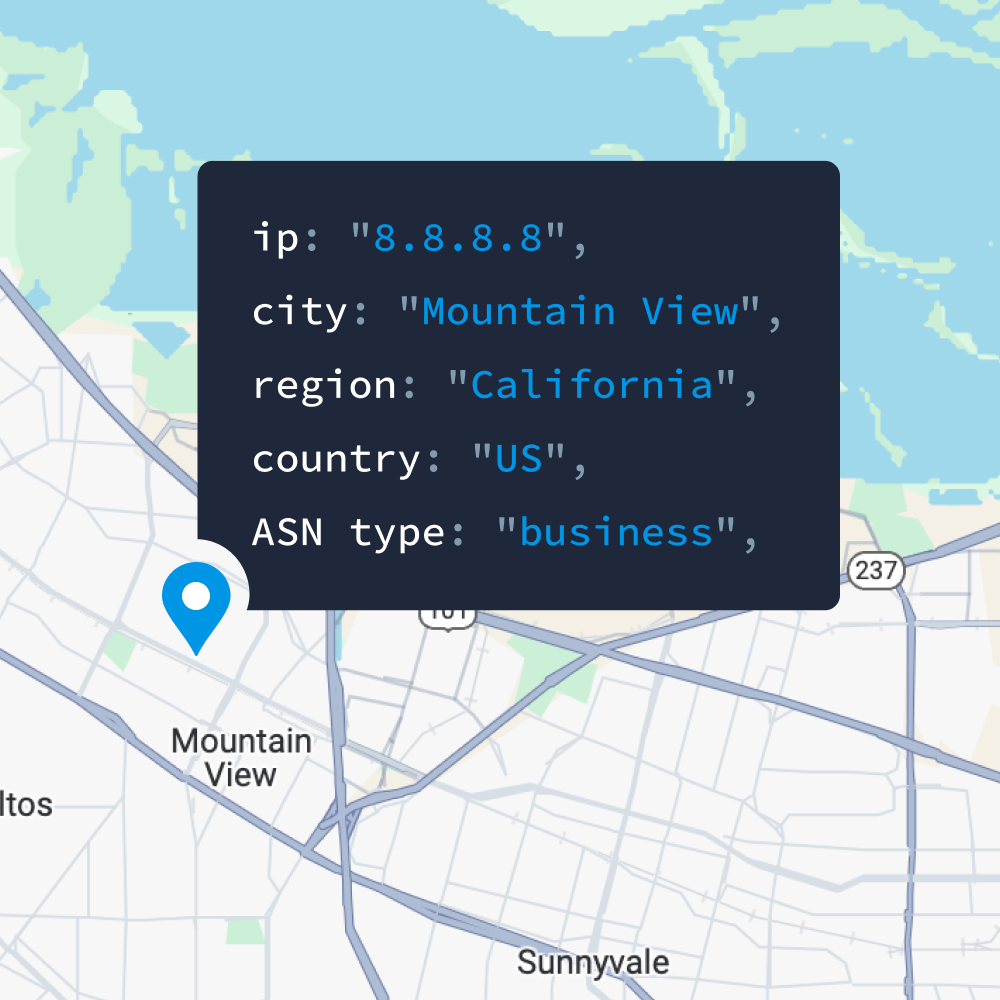 My IP ↗or
My IP ↗orAd fraud is silently draining ad budgets—costing marketers over $84 billion in 2023, nearly 25% of all online ad spend. Worse, this number is expected to double by 2028.
Click fraud, a major subset of ad fraud, is particularly damaging to PPC campaigns—leading to wasted spend, inflated metrics, and lost revenue. If adtech platforms don’t implement fraud prevention mechanisms, they risk losing advertiser trust and ROI.
Adtech platforms that want to provide the best ROI for their customers must get ahead of this concerning trend to stay competitive.
We help customers like Adcash prevent ad fraud by incorporating IP data into their ad performance metrics and fraud detection mechanisms. Advertising fraud, as an online scam, is quite unique, and many standard threat prevention practices will not work. However, IPinfo’s IP data suite can help you build systems that prevent ad fraud and design a better monetization framework.
Read on to learn how click fraud works and how IPinfo empowers adtech companies to prevent it.
What Is Click Fraud?

Imagine you run an advertising platform that places digital ads on publisher websites. These publishers earn money every time a visitor clicks on an ad, following the Pay-Per-Click (PPC) model.
The problem? Not all clicks are real. Fraudsters use bots, click farms, and VPNs to generate fake clicks, inflating their ad revenue without delivering real users or conversions.
If adtech platforms don’t detect fraudulent traffic, they risk paying for meaningless clicks, hurting advertiser ROI and campaign performance.
The affiliate website hosting your advertisement should be generating clicks on your ad from the traffic to their site. Consider this: if a website generates thousands of clicks per day, from your perspective as the advertisement platform, you would imagine that the website is fantastic and generating a lot of revenue for your client. Moreover, you are not only paying for these clicks; you are also interested in raising their PPC rate–investing even more money in that site–because of the traffic.
But how can you be sure that these clicks have value?
As an advertisement platform, you are getting paid by your clients to create and manage digital ads that attract people to visit the client’s website.
The dilemma here is that the website hosting your ads is incentivized to produce only clicks, and they can use bots and click farms to click on the ads you put there. These bots click on the ads, and you, as the advertisement platform, may assume this is genuine traffic these sites are bringing to your client’s website or service. As PPC payments are made fairly quickly (as frequently as daily), you could be paying for bot traffic that does not help your client at all.
Now, if your clients come back to say that the “people” who clicked on the advertisement and visited their site did not buy anything, and your clients ended up paying for your service for nothing, your reputation in the industry will take a massive hit.
That is where IP data comes into play as a fundamental guardrail against click fraud. IP data can not only prevent fraudulent clicks and identify click farms, but it can also help with dynamic pricing for ad clicks.

Identifying Bots Committing Click Fraud
One of the most effective ways to detect click fraud is by analyzing IP privacy data. IPinfo’s privacy detection data is available via API service or database download and identifies bot-generated clicks by detecting IPs from:
- Hosting providers & data centers (often used for large-scale fraud operations)
- VPNs & proxies (used to mask bot identities)
- Tor networks & anonymizers (often linked to fraudulent activity)
Going beyond anonymous IPs, you should also look into whether residential proxies are in play. Large-scale click fraud, which often utilizes malicious bots, can use residential proxies to mimic regular home internet connections. For advanced identification of bot activities, our residential proxy database tracks the ISP/residential IP addresses used in proxies, the proxy service provider name, and hints on usage frequency with information such as the last seen date and how many days the activity was seen in an IP within a 90-day period window.
As advertisement platforms, the website ad usually goes through your servers before being redirected to your client’s websites. When the visitor goes through the server via the redirect URL, you will have access to their IP address. Then, you can simply look up the IP address with IPinfo to get contextualized data ranging from whether an IP address is using a VPN to the name of the VPN service provider.
By flagging these suspicious IP addresses, ad platforms can automate fraud prevention, ensuring advertisers pay only for genuine traffic.
Bot / Hosting / Data Center / Cloud Provider IP address
curl ipinfo.io/136.175.28.225?token=$token | jq .privacy
{
"vpn": false,
"proxy": false,
"tor": false,
"relay": false,
"hosting": false,
"service": ""
}VPN IP Address
curl ipinfo.io/102.38.246.8?token=$token | jq .privacy
Response:
{
"vpn": true,
"proxy": false,
"tor": false,
"relay": false,
"hosting": false,
"service": "Hotspot Shield"
}If the hosting flag is true, that means the IP address belongs to a hosting provider or is a data center IP address, which usually indicates a bot. A bot is designed to be hosted on a server that can mimic the behavior of a regular visitor visiting the affiliate website and clicking on an ad.
We also tag VPN, proxy, Tor, and relay services in our IP to Privacy Detection data. We let our users choose which IP addresses they deem appropriate for their ad traffic. A VPN user can be a real human interested in your ads, but it can also be used to hide a bot’s real IP address.
As the advertising platform, you decide how you want to treat traffic based on IP address privacy detection metadata. You can also use the service field to identify certain VPN providers as genuine traffic.
In our residential proxy database, we identify a large pool of IPs used in ISP proxies, which is traditionally very difficult to identify due to the nature of internet connection and consequently is heavily used in ad fraud.
Residential Proxy IP
$ mmdbctl read 1.0.136.251 proxy_residential.mmdb | jq
{
"last_seen": "2025-01-31",
"percent_days_seen": "1",
"service": "proxyempire"
}
Identifying Click Farms

The privacy detection and residential proxy service is adequate to prevent the vast majority of PPC fraud. However, if you are interested in achieving near-absolute prevention of click fraud, you must consider click-to-earn services and clickfarms.
Unlike bots, click farms rely on real human operators using mobile devices to mimic legitimate ad interactions. These fraudulent clicks are harder to detect because they come from real mobile carriers instead of hosting providers.
How to detect click farms? IPinfo’s IP data can flag unusual traffic patterns, such as:
- A high volume of clicks from the same mobile carrier
- Clicks originating outside the advertiser’s target region
- Clusters of clicks from the same ASN (autonomous system number)
By integrating IP intelligence, ad platforms can filter out fake engagement and protect advertisers’ budgets.
Example of a full IPinfo API response:
curl ipinfo.io/103.60.XXX.XXX?token=$token
{
"ip": "103.60.XXX.XXX",
"hostname": "103.60.175-0.mazedanetworks.net",
"city": "Dhaka",
"region": "Dhaka Division",
"country": "BD",
"loc": "23.7104,90.4074",
"postal": "1000",
"timezone": "Asia/Dhaka",
"asn": {
"asn": "AS63996",
"name": "Mazeda Networks Limited",
"domain": "mazedanetworks.net",
"route": "103.60.XXX.XXX/24",
"type": "isp"
},
"company": {
"name": "Mazeda Networks Limited",
"domain": "mazedanetworks.net",
"type": "isp"
},
"carrier": {
"name": "Grameenphone",
"mcc": "470",
"mnc": "01"
},
"privacy": {
"vpn": false,
"proxy": false,
"tor": false,
"relay": false,
"hosting": false,
"service": ""
},
"abuse": {
"address": "Zaman Rose Garden, House # 123, Road 13/A, Flat B4 West Dhanmondi, Dhaka",
"country": "BD",
"email": "abuse@mazedanetworks.net",
"name": "ABUSE MNLBD",
"network": "103.60.XXX.XXX/24",
"phone": "+000000000"
},
"domains": {
"total": 0,
"domains": []
}
}To prevent clickfarms and click-to-earn services, you need to create a model to identify click fraud based on IP data. To build robust click farm detection, combine these key data points from IPinfo:
- Geolocation pattern analysis using our IP to geolocation data: If your target audience is based in the United States but the vast majority of clicks on your ads come from outside the United States, that should be a cause for concern.
- Track click distribution across regions
- Flag sudden spikes from unexpected locations
- Set thresholds for suspicious geographic patterns
- Carrier IP monitoring with our IP to carrier detection data: If a website exclusively contains carrier IP addresses, that should be concerning, as many click farms use mobile devices. The majority of click-to-earn service users consist of mobile users as well.
- Establish a baseline for mobile carrier traffic
- Monitor for unusual carrier concentration
- Track the velocity of clicks from carrier IPs
- ASN/organization analysis with our IP to company data: If a website receives a vast amount of traffic from the same ASN or the same internet organization, it could be concerning as a click farm may use the services of the same ISP for all their devices.
- Build profiles of legitimate traffic patterns
- Set alerts for abnormal concentrations from single ASNs
- Track historical patterns by organization
You have to look into your data and enrich it with our IP metadata to understand the context and behavior of visitors based on IP data. You can prevent IP addresses that meet certain IP metadata criteria or you can even set up a dynamic PPC rate. How you use the data to make decisions is entirely up to you.
The Business Impact of Click Fraud
Click fraud isn’t just an inconvenience—it has serious financial and operational consequences for adtech companies. Without a strong fraud prevention strategy, businesses risk losing millions in wasted ad spend, unreliable campaign performance, and diminished trust from advertisers. Here’s why proactive fraud prevention is essential:
- Maximizing ROI: Fraudulent clicks deplete ad budgets without delivering real engagement or conversions. By actively preventing click fraud, adtech companies ensure that every dollar spent reaches a real user, driving genuine interactions and maximizing return on investment.
- Better analytics: Click fraud skews analytics, making it difficult to assess campaign effectiveness and optimize performance. Invalid traffic inflates metrics like clickthrough rates and conversion rates, leading to misguided bidding strategies and wasted resources.
- Stronger advertiser trust: Advertisers expect their budgets to be spent efficiently, and fraudulent clicks undermine that trust. If an ad platform fails to prevent click fraud, advertisers may reduce spend or shift to competitors with better fraud prevention measures.
Accurate, contextualized IP data from IPinfo can ensure that advertising platforms build and maintain a happy customer experience.
Success Story: How Adcash Stopped Click Fraud with IPinfo
Since incorporating IPinfo’s data in 2022, Adcash has seen 1-3% profit increases, 1-10% sales increases for CPA advertisers, and 5-10% growth for suppliers–plus the near certainty that the traffic they’re getting represents real monetization opportunities.
“IPinfo was the easiest way to integrate and also offered the most correct data,” says Yonko Tsonev, Head of IT at Adcash. “We’ve seen a clear improvement in our results, and we haven't seen that with other data providers.”
Implementation Process:
- Integrated IPinfo's API into their traffic validation pipeline
- Established baseline metrics for legitimate traffic
- Created custom scoring model using IPinfo data
- Implemented real-time prevention system
Fraud prevention isn’t just about stopping bad actors—it’s about creating a more trustworthy, effective, and data-driven advertising ecosystem. By taking proactive measures, adtech companies can safeguard revenue, enhance performance, and maintain advertiser confidence. If your adtech company is interested in optimizing results for your customers, IPinfo can help.
Optimize your ad spend with IPinfo data
Prevent click fraud with our enriched IP data, which includes privacy detection, geolocation, and more.
About the author

Abdullah leads the IPinfo internet data community and he also works on expanding IPinfo’s probe network of servers across the globe.

